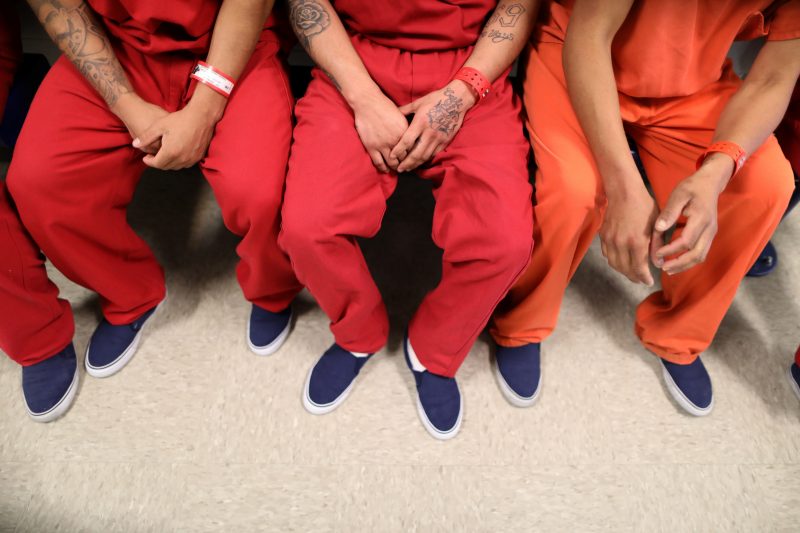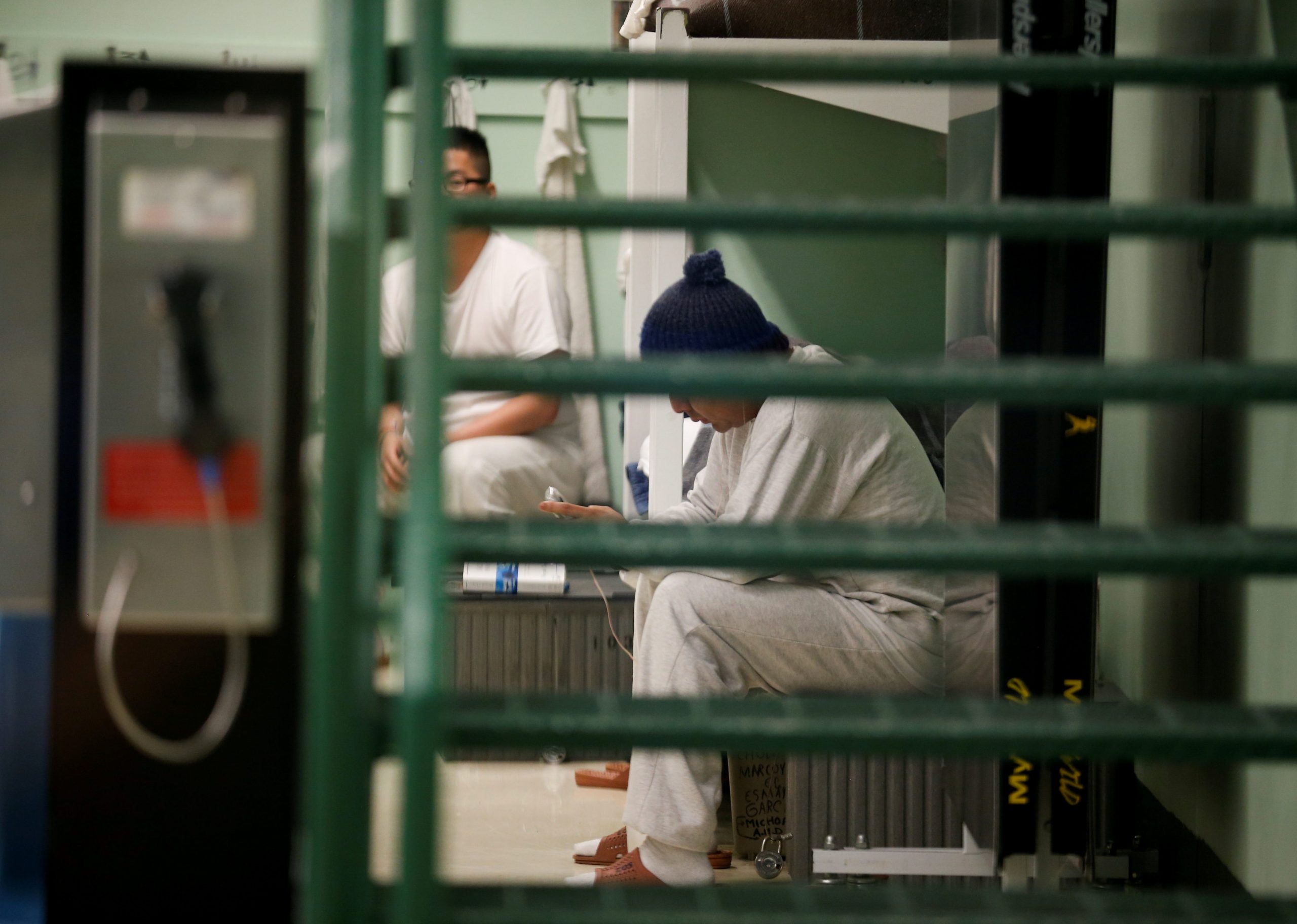- As the novel coronavirus pandemic hits immigration detention facilities across the country, ICE is resorting to quarantining whole dormitories and firing tear gas and rubber bullets at protesting detainees.
- Detainees already endure medical negligence. Many lack access to soap except in the showers; hand sanitizer is forbidden.
- One woman facing deportation to her native Cameroon contracted Hepatitis A in detention, and fears that a woman in a neighboring cell may have contracted the virus.
- Joe Penney is a freelance writer.
- Visit Insider’s homepage for more stories.
As the coronavirus infection rate explodes in the U.S., immigration advocates, lawyers and detainees paint a picture of “chaos” and a situation spiraling rapidly out of control in ICE detention centers, threatening the lives of more than 37,000 detainees in immigration jails across the country.
On Tuesday, ICE announced that an immigrant held at the Bergen County Jail in Hackensack, NJ became the agency’s first detainee to test positive for COVID-19, and stated that it is “suspending intake at the facility.”
Even though there is only one confirmed case of COVID-19 among detainees, advocates say the disease is likely “spreading like wildfire” in multiple locations, forcing ICE personnel to stay at home while a lack of testing, ineffective quarantines, crowding and denial of basic hygienic needs, all put detainees at heightened risk.
The crisis is manifesting in numerous ways, from quarantining whole dormitories, to guards firing tear gas and rubber bullets at protesting detainees.
In the South Texas Detention Center in Pearsall, Texas, operated by private prison firm Geo Group, "people are being teargassed reportedly because they were refusing to go back into their dorms to be locked up alongside people who were experiencing symptoms," Bethany Carson, immigration policy researcher at Grassroots Leadership, told Insider.
Alicia, an immigration advocate at Grassroots Leadership, said detainees who normally work in the kitchen reported there was no food. "All the custodial and kitchen personnel who normally work there were no longer there," she said.
Since Sunday, ICE has restricted medical visits for detainees at Pearsall and has turned off the TVs, limiting their access to information about the novel coronavirus, Alicia said. The agency has also restricted videoconferencing and the use of tablets that detainees use to send messages to their relatives. They worry the phone lines will be cut next.
The situation at Pearsall reflects the broader crisis threatening to engulf ICE.

A Department of Homeland Security document leaked to The Nation showed that 120 ICE employees were in "precautionary self-quarantine" as of March 18. A staffer in a New York City immigration court tested positive, which prompted the court's closing. More than 3,000 medical professionals have signed a letter warning ICE that proper social distancing measures are not possible in detention centers. The letter also called for the release of detainees-who are not being tested-to stop the spread of the virus.
"What are you going to do with all these people who may have symptoms, who may be positive? You have no way of testing, but they're not violent offenders," Yvonka Hall, executive director of the Northeast Ohio Black Health Coalition said. "They need to be released before this gets worse."
A plan for 'quarantined' detention facilities
Rather than releasing the immigrants it is holding, ICE has requested $249 million in emergency coronavirus response funds to, among other initiatives, outfit "quarantined" detention facilities along the U.S.-Mexico border. It has also put out a tender for 45,000 respirator masks for its deportation officers, at a time when medical workers across the country say they "desperately need" basic protective equipment. Business is booming for its detention centers where abuse has been reported for decades: on March 20, ICE awarded a $50 million contract to the for-profit Houston Processing Center, and South Texas Detention will be up for a 10-year contract renewal shortly.
The use of violence against detainees is not limited to South Texas Detention Center.
At the Pine Prairie Processing Center in Louisiana, where 43 Cameroonian men went on hunger strike earlier this month demanding an end to what they say are biased and illegal efforts by DHS and an immigration judge to deport them, ICE is quarantining detainees.
On Tuesday night, guards fired rubber bullets and tear gas at people protesting for safer conditions, according to Katrina Huber, project coordinator with the Southeast Immigrant Freedom Initiative, a project of the Southern Poverty Law Center.
"There's a person in the dorm that was suspected of being infected with COVID-19, so they removed that person from the dorm and then put the rest of the dorm on lockdown," Huber said. There are at least 60 people in that crowded dormitory who are now locked inside all day and all are now potentially infected, she added.
The quarantine measures are in place to prevent those detainees from infecting others in the center, rather than preventing an outbreak among that group, Huber said. Detainees are also reporting quarantines at LaSalle Detention Center in Jena, Louisiana, where two immigrants from India have been on a hunger strike for more than 180 days. On Thursday, BuzzFeed News obtained a document stating that "ICE medical officials, along with members from the private prison company running the facility, GeoGroup, held a meeting about COVID-19 at LaSalle," and that "officials used "pepper balls" on 23 detainees at the LaSalle facility following a protest."
Detainees are already subject to medical negligence and are still living and eating with each other, against CDC guidelines. Many lack access to soap except in the showers, and hand sanitizer is forbidden because of its alcohol content.
At the Adelanto Processing Center in southern California, "the West-4 dorm for men at Adelanto is under quarantine and it appears to be a preventive measure," a California-based immigration activist who asked to remain anonymous to protect her access to people in detention, told Insider. "Someone in that dorm got a fever and was taken to the medical unit, that other men in the dorm were told to pack up his belongings and that the entire dorm was placed under quarantine," she said.

Elvira, a 26-year-old asylum seeker in Adelanto who has been in detention for three years, is battling a deportation order that would send her back to her native Cameroon, where she fears for her life as an Anglophone caught up in a brutal civil war, according to Sylvie Bello, president of the Cameroon American Council.
Elvira contracted Hepatitis A in detention, putting her at high risk of hospitalization if she contracts COVID-19. She has told her sister that a woman in the cell next to hers has been coughing for days.
Elvira had a bond hearing scheduled for Tuesday but it was postponed for two weeks. Cameroon has closed its borders due to COVID-19, making it unclear what would happen if she lost her appeal.
ICE to continue business as usual
Amid all this, ICE continues to move detainees around the country, despite the obvious public health dangers this poses. A group of 200 Cameroonian women who protested medical neglect were subsequently transferred from Don Hutto ICE facility in Texas to detention centers throughout Texas, Louisiana, and Mississippi as punishments for their action, according to Carson.
The union that represents immigration court judges has called for a nation-wide closure of the courts, but although some have closed or postponed their hearings, the majority of them remain open. It's not clear if the courts are subject to stay-at-home rules, and those that have shut down have largely done so due to pressure from court employees, not from the local, state or federal government.
Immigration lawyer Pryde Ndingwan continues to fly to hearings across the country, despite the clear health risks.
"It's easier for us to stay in the safety of our homes while people are languishing in jail, but I signed up for this work, to represent people and seek justice for them," Ndingwan said. "If I have to die in the line of duty, that's what I signed up for: justice for my people."
